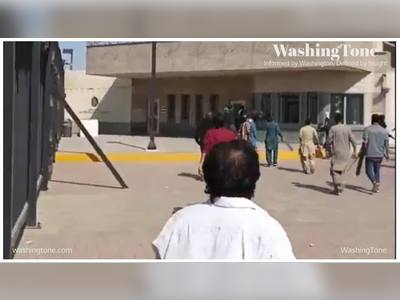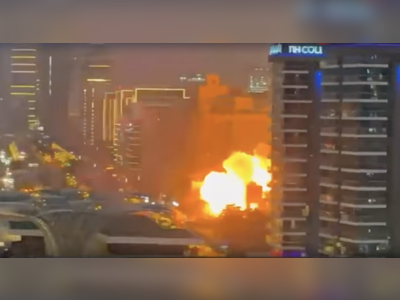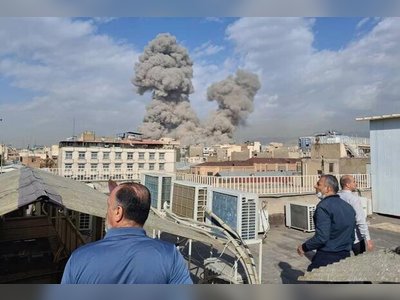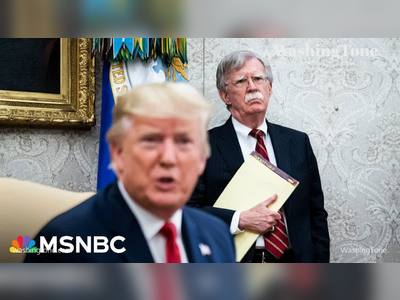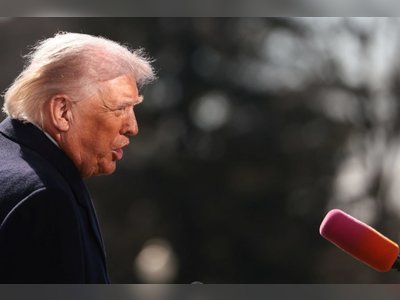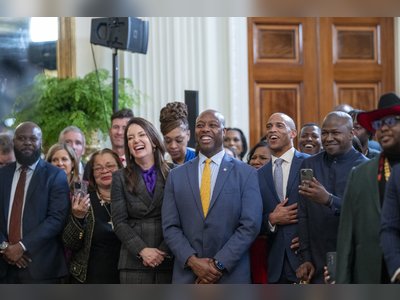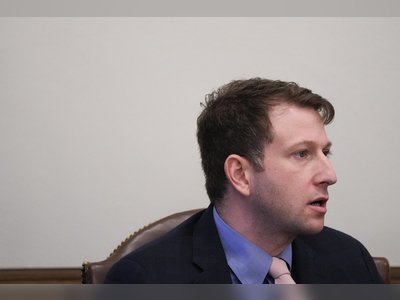White HouseSenateThe HouseSupreme CourtFederal ReserveDOJState DepartmentTreasuryCensusBudget OfficeTrade Representative
WashingTone
Informed by Washington, Defined by Insight
Monday, Mar 02, 2026
WashingTone

G7 Condemns Maduro's Swearing-In, Calls for Respect for Venezuelan Democracy
The G7 urges a peaceful, democratic transition in Venezuela after the disputed 2024 elections and ongoing repression under Maduro's regime.
WASHINGTON — On January 10, 2025, the foreign ministers of the G7 nations—comprising Canada, France, Germany, Italy, Japan, the United Kingdom, and the United States—along with the European Union's High Representative, released a forceful statement condemning the inauguration of Nicolás Maduro as Venezuela's president.
The G7 voiced serious concerns regarding the democratic legitimacy of the election, citing irregularities, voter suppression, and continuous oppression of political opposition.
Condemnation of Maduro’s Presidency
The G7's denunciation arises from widespread global concerns about the integrity of the July 28, 2024, elections.
Independent observers and electoral reports indicate that a substantial number of Venezuelans voted for change.
Nevertheless, Maduro's administration remains intent on holding onto power, a stance perceived by many as undemocratic and oppressive.
In their joint statement, the G7 reiterated their disapproval of Maduro’s continued control, viewing it as a direct challenge to the will of the Venezuelan populace.
The ministers stressed that Venezuelans had chosen change through peaceful means and saw Maduro’s inauguration as an act of political defiance against the democratic process.
Oppression of Opposition and Civil Society
The G7 emphasized the ongoing repression faced by opposition leaders and civil society figures in Venezuela as a crucial issue in their statement.
They deplored the forced exile of opposition leader Edmundo González Urrutia, who reportedly won the 2024 election according to credible sources.
Urrutia’s departure in September illustrates the broader trend of suppression under Maduro's leadership, which the G7 believes should not be accepted within any democratic society.
Besides Urrutia's ordeal, the G7 also voiced concerns about María Corina Machado, another key opposition figure, who has faced harassment and legal challenges.
The G7 argued that such tactics create a climate of fear that inhibits free political engagement and weakens Venezuela’s democratic institutions.
Human Rights Abuses and Political Detentions
The G7 condemned the extensive human rights abuses in Venezuela, particularly the arbitrary arrests of peaceful protesters, activists, and even minors.
Post-elections, anti-Maduro protests have been met with harsh repression, resulting in numerous arrests and fatalities.
The G7 ministers expressed distress over the systematic abuse of citizens, noting that these actions starkly contrast with the principles of human rights and the rule of law.
The joint statement specifically addressed the Venezuelan government’s handling of protests, criticizing the violent methods employed by security forces against unarmed civilians.
According to human rights organizations, Venezuelan authorities have used disproportionate force to suppress dissent, further hindering the nation's ability to cultivate a healthy political environment.
Regional Impact of the Venezuelan Crisis
The G7 highlighted increasing concern over the widespread effects of Venezuela’s political and humanitarian crisis on regional stability.
Venezuela has witnessed a massive outflow of citizens, with millions fleeing in search of safety and improved living conditions.
This exodus has placed immense pressure on neighboring countries like Colombia and Brazil, which have taken on the responsibility of supporting and housing refugees.
The humanitarian crisis in Venezuela, worsened by political instability, has generated economic difficulties throughout the region.
Although many nations have shown solidarity with Venezuelan refugees, the resource strain has been felt across South America, particularly in countries already dealing with their own economic issues.
The Need for a Peaceful, Venezuelan-Led Transition
Despite the dire circumstances, the G7 reiterated its support for a peaceful, democratic transition in Venezuela.
The foreign ministers emphasized the importance of a solution that is both negotiated and led by Venezuelans, asserting that Venezuelans should determine their own future without external interference.
The G7 called for an end to the repression of opposition voices and urged the international community to continue placing diplomatic pressure on the Maduro regime to respect the democratic will of the Venezuelan people.
The statement also highlighted that a peaceful transition would necessitate the full involvement of all political actors and a commitment to human rights.
Challenges and Opportunities Ahead
The path to a peaceful resolution in Venezuela is fraught with challenges.
Maduro’s entrenched control over the military and security forces, along with support from key international allies, complicates efforts to enact meaningful change.
Furthermore, Venezuela’s economic crisis has made achieving long-term stability increasingly difficult, with the nation facing inflation, shortages of essentials, and widespread poverty.
However, there are also glimmers of hope.
International organizations, human rights groups, and regional stakeholders have pledged to support Venezuela’s democratic transition, with ongoing efforts to bring the opposition and government to the negotiating table.
The G7's commitment is clear: they will continue collaborating with the international community to ensure Venezuela’s future is one of peace, democracy, and human rights.
However, Venezuela's future depends on the willingness of the Maduro regime to relinquish its hold on power and engage in meaningful dialogue with all sectors of Venezuelan society.
Summary:
The G7’s condemnation of Nicolás Maduro’s inauguration highlights the global community’s growing alarm over the erosion of democratic values in Venezuela.
As the country faces political repression, human rights violations, and a severe humanitarian crisis, the call for a peaceful, Venezuelan-led transition remains crucial.
The world must stand united in supporting Venezuelans' right to self-determination and democratic governance.
The G7 voiced serious concerns regarding the democratic legitimacy of the election, citing irregularities, voter suppression, and continuous oppression of political opposition.
Condemnation of Maduro’s Presidency
The G7's denunciation arises from widespread global concerns about the integrity of the July 28, 2024, elections.
Independent observers and electoral reports indicate that a substantial number of Venezuelans voted for change.
Nevertheless, Maduro's administration remains intent on holding onto power, a stance perceived by many as undemocratic and oppressive.
In their joint statement, the G7 reiterated their disapproval of Maduro’s continued control, viewing it as a direct challenge to the will of the Venezuelan populace.
The ministers stressed that Venezuelans had chosen change through peaceful means and saw Maduro’s inauguration as an act of political defiance against the democratic process.
Oppression of Opposition and Civil Society
The G7 emphasized the ongoing repression faced by opposition leaders and civil society figures in Venezuela as a crucial issue in their statement.
They deplored the forced exile of opposition leader Edmundo González Urrutia, who reportedly won the 2024 election according to credible sources.
Urrutia’s departure in September illustrates the broader trend of suppression under Maduro's leadership, which the G7 believes should not be accepted within any democratic society.
Besides Urrutia's ordeal, the G7 also voiced concerns about María Corina Machado, another key opposition figure, who has faced harassment and legal challenges.
The G7 argued that such tactics create a climate of fear that inhibits free political engagement and weakens Venezuela’s democratic institutions.
Human Rights Abuses and Political Detentions
The G7 condemned the extensive human rights abuses in Venezuela, particularly the arbitrary arrests of peaceful protesters, activists, and even minors.
Post-elections, anti-Maduro protests have been met with harsh repression, resulting in numerous arrests and fatalities.
The G7 ministers expressed distress over the systematic abuse of citizens, noting that these actions starkly contrast with the principles of human rights and the rule of law.
The joint statement specifically addressed the Venezuelan government’s handling of protests, criticizing the violent methods employed by security forces against unarmed civilians.
According to human rights organizations, Venezuelan authorities have used disproportionate force to suppress dissent, further hindering the nation's ability to cultivate a healthy political environment.
Regional Impact of the Venezuelan Crisis
The G7 highlighted increasing concern over the widespread effects of Venezuela’s political and humanitarian crisis on regional stability.
Venezuela has witnessed a massive outflow of citizens, with millions fleeing in search of safety and improved living conditions.
This exodus has placed immense pressure on neighboring countries like Colombia and Brazil, which have taken on the responsibility of supporting and housing refugees.
The humanitarian crisis in Venezuela, worsened by political instability, has generated economic difficulties throughout the region.
Although many nations have shown solidarity with Venezuelan refugees, the resource strain has been felt across South America, particularly in countries already dealing with their own economic issues.
The Need for a Peaceful, Venezuelan-Led Transition
Despite the dire circumstances, the G7 reiterated its support for a peaceful, democratic transition in Venezuela.
The foreign ministers emphasized the importance of a solution that is both negotiated and led by Venezuelans, asserting that Venezuelans should determine their own future without external interference.
The G7 called for an end to the repression of opposition voices and urged the international community to continue placing diplomatic pressure on the Maduro regime to respect the democratic will of the Venezuelan people.
The statement also highlighted that a peaceful transition would necessitate the full involvement of all political actors and a commitment to human rights.
Challenges and Opportunities Ahead
The path to a peaceful resolution in Venezuela is fraught with challenges.
Maduro’s entrenched control over the military and security forces, along with support from key international allies, complicates efforts to enact meaningful change.
Furthermore, Venezuela’s economic crisis has made achieving long-term stability increasingly difficult, with the nation facing inflation, shortages of essentials, and widespread poverty.
However, there are also glimmers of hope.
International organizations, human rights groups, and regional stakeholders have pledged to support Venezuela’s democratic transition, with ongoing efforts to bring the opposition and government to the negotiating table.
The G7's commitment is clear: they will continue collaborating with the international community to ensure Venezuela’s future is one of peace, democracy, and human rights.
However, Venezuela's future depends on the willingness of the Maduro regime to relinquish its hold on power and engage in meaningful dialogue with all sectors of Venezuelan society.
Summary:
The G7’s condemnation of Nicolás Maduro’s inauguration highlights the global community’s growing alarm over the erosion of democratic values in Venezuela.
As the country faces political repression, human rights violations, and a severe humanitarian crisis, the call for a peaceful, Venezuelan-led transition remains crucial.
The world must stand united in supporting Venezuelans' right to self-determination and democratic governance.
